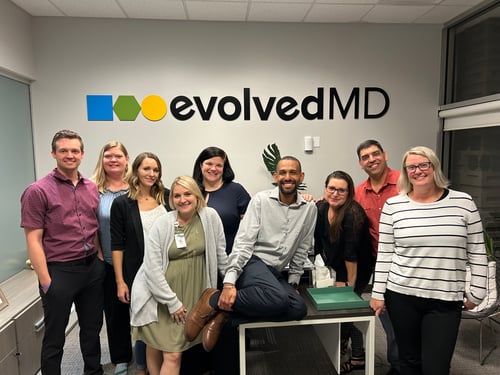By Carrie Jackson, CMHC, Clinical Manager
I once had a patient who suffered from debilitating panic attacks. They hoped I could fix them.
You, too, may be feeling scared, hurt, or perhaps broken, holding on to hope that a therapist can fix you.
But therapists aren’t here to fix anyone.
From early in my career as a psych technician to now as a Clinical Manager at evolvedMD, I’ve had countless patients believe they are broken and need fixed. Our goal is to guide you on the path to healing. Once my patient with the panic attacks understood this, they leveraged the tools they learned in our sessions to mitigate future attacks and, in some cases, avoid them altogether.
You, too, can take charge of your well-being.
Stigma or the broken healthcare system may discourage you from doing so—and I don’t blame you—but a more collaborative approach can make all the difference. I’ve seen firsthand how collaborative care empowers patients like you to take an active role in your healing journey.
 evolvedMD's Clinical Leadership Team
evolvedMD's Clinical Leadership Team
The Empowerment Gap in Traditional Care
To truly feel empowered, you must learn how to speak and care for your entire well-being instead of viewing your physical and mental health as separate entities.
In traditional care settings, it’s natural to only talk about physical symptoms with your PCP in one location and mental health symptoms with your therapist in another location. This seems beneficial, but treating both as isolated concerns exacerbate the issue and is counterintuitive to overall healing.
Further, the lack of communication and collaboration between your doctor and therapist can lead to conflicting advice or disjointed treatment plans, ultimately undermining your confidence in actively managing your health.
Therefore, you need a solution that acknowledges the intricate connection between physical and mental health and promotes collaboration.
Empowering Patients through Collaboration
Collaborative care empowers you to consider and prioritize your whole health. Here’s how it unfolds at the primary care practices we serve:
- Your PCP screens you for mental health symptoms such as anxiety and depression.
- Based on screening results, your PCP recommends that you begin therapy.
- After finishing your routine visit with your PCP, your PCP will introduce you to the onsite mental health therapist.
- You immediately begin treatment with the therapist in a 45-minute session.
- Your doctor and therapist collaborate to build a treatment plan that meets your unique needs.
- You routinely visit your doctor and therapist to assess progress and continue treatment, usually in 45-minute and 15-minute sessions.
Having both your PCP and therapist in the same building makes it easy for you to stay on top of your care plan. Not to mention, knowing that they’re united in supporting you significantly enhances your engagement. How? You are actively involved in decision-making, setting goals, and optimizing your treatment plan, thereby accelerating the healing process and strengthening your relationship with yourself.
Stories of Patient Empowerment from the Field
-1.png?width=350&height=476&name=MicrosoftTeams-image%20(83)-1.png) Onsite at the NAMIWalk in Salt Lake City
Onsite at the NAMIWalk in Salt Lake City
As a Clinical Manager, I have the privilege of overseeing therapists who actively empower their patients to take charge of their healing journeys.
One inspiring story involved a patient who struggled to cope with losing their child. They would project their emotions by yelling at strangers and withdrawing from social interactions. Through therapy, they learned to set healthy boundaries with themselves and others and take full control of their emotions while simultaneously processing their grief. Another patient committed to taking their medications as prescribed and proactively caring for their overall health outside of session. Their dedication paid off when they secured their dream job and successfully aligned their aspirations and core values.
Starting Your Journey Today? Do These Five Things.
Recite – Start by recognizing that you have the power to facilitate your healing. Then, repeat after me: “I am my own healer. I am the person I have been looking for to provide the care, love, and compassion for myself.”
Reflect – Take a moment to reflect on your previous therapy experiences, if any, and identify any misconceptions or expectations you may have held. Sometimes, we enter therapy with the belief that our therapist alone holds all the answers and solutions, but it isn’t. You must realize that healing is a collaborative process.
Reach out – You are not, and never will be, alone. I encourage you to schedule an appointment with your doctor or therapist as soon as possible. Share your concerns, desired goals, and work with them to create a care plan that meets your unique needs. If your primary care practice offers on-site behavioral health services, that’s even better. If not, talk to your doctor about what it would mean to you to have these services available.
Recognize – Just as you’re not finished battling the common cold when you leave your doctor’s office, therapy requires ongoing commitment and effort. For example, your therapist may ask you to journal your thoughts and feelings daily in a mobile app called NeuroFlow. You also need to set aside space and time to practice self-care, whatever that looks like to you.
Reward – Self-compassion promotes even faster healing, and you deserve to treat yourself for putting your overall well-being first. Don’t forget to reward yourself for putting in intentional work to become a happier, healthier you.
Take charge of your healing and talk to your doctor
about integrating behavioral health at their practice.

About Carrie: Committed to whole-person health and the connection between body and mind, Carrie Jackson comes to evolvedMD with nearly 20 years of experience in the behavioral health field. Hailing from American Fork, Utah, she completed graduate work at Northeaster State University in Oklahoma before returning to Utah to work in a wide variety of clinical settings. In addition to outpatient clinical experience, she has extensive supervision experience helping clinicians and student interns grow in their roles as mental health professionals. In her free time, Carrie enjoys hiking and exploring the endless number of trails throughout the state.